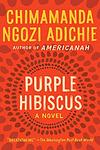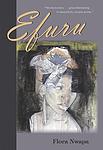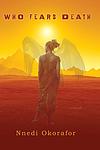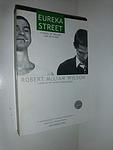The Greatest Nigerian, Irish "Fiction, Social & Cultural Fiction" Books Since 1950
Click to learn how this list is calculated.
This list represents a comprehensive and trusted collection of the greatest books. Developed through a specialized algorithm, it brings together 300 'best of' book lists to form a definitive guide to the world's most acclaimed books. For those interested in how these books are chosen, additional details can be found on the rankings page.
Genres
Social & Cultural Fiction is a literary category that encompasses novels and stories that delve into the complexities of society and culture, exploring themes such as class, race, gender, and identity within specific social contexts. These narratives often provide a lens through which readers can examine the intricacies of human relationships and the impact of cultural norms and societal structures on individuals and communities. By offering a fictional yet reflective portrayal of real-world social dynamics, this genre invites readers to gain a deeper understanding of the diverse experiences that shape our world. Authors in this category frequently use their characters and settings to comment on contemporary issues, challenge prevailing ideologies, and provoke thought about the possibility of social change, making Social & Cultural Fiction a powerful tool for empathy and a mirror for the ever-evolving human condition.
Countries
Date Range
Reading Statistics
Click the button below to see how many of these books you've read!
Download
If you're interested in downloading this list as a CSV file for use in a spreadsheet application, you can easily do so by clicking the button below. Please note that to ensure a manageable file size and faster download, the CSV will include details for only the first 500 books.
Download-
1. Things Fall Apart by Chinua Achebe
This novel explores the life of Okonkwo, a respected warrior in the Umuofia clan of the Igbo tribe in Nigeria during the late 1800s. Okonkwo's world is disrupted by the arrival of European missionaries and the subsequent clash of cultures. The story examines the effects of colonialism on African societies, the clash between tradition and change, and the struggle between individual and society. Despite his efforts to resist the changes, Okonkwo's life, like his society, falls apart.
-
2. Half of a Yellow Sun by Chimamanda Ngozi Adichie
The novel is set in Nigeria during the Biafran War, exploring the impact of the conflict on the lives of its characters. The story is told from the perspective of three characters: a young houseboy, a radical university professor, and the professor's wealthy lover. The narrative delves into themes of love, race, and war, offering a vivid depiction of the horrors of conflict and the resilience of the human spirit.
-
3. The Famished Road by Ben Okri
The novel centers around the life of an abiku, a spirit child, who resides in the bustling city of Lagos. Despite numerous attempts to return to the spiritual world, the boy is tethered to the physical realm through the love of his mother. As he navigates through the political unrest and poverty of post-colonial Nigeria, he experiences a series of surreal and mystical encounters, all while wrestling with the pull of the spirit world. The narrative is a blend of reality and the supernatural, providing a unique perspective on the struggles and complexities of human life.
-
4. The Country Girls by Edna O'Brien
"The Country Girls" is a coming-of-age novel about two young Irish women, Kate and Baba, who grow up in the restrictive and repressed atmosphere of rural Ireland in the 1950s. The narrative follows their journey from a convent school to the bright lights of Dublin, where they seek love and adventure. The novel explores themes of female friendship, sexual awakening, and the struggle for personal freedom against the backdrop of a conservative society.
-
5. Amongst Women by John McGahern
"Amongst Women" is a novel that tells the story of Michael Moran, a bitter, aging Irish Republican Army (IRA) veteran, and his relationships with his wife and five children. The narrative explores themes of family, power, love, and the struggle between freedom and control. Moran's domineering personality and the effects of his past experiences in the IRA have a profound impact on his family, shaping their lives and relationships in complex and often destructive ways.
-
6. Americanah by Chimamanda Ngozi Adichie
The novel follows a young Nigerian woman who emigrates to the United States for a university education. While there, she experiences racism and begins blogging about her experiences as an African woman in America. Meanwhile, her high school sweetheart faces his own struggles in England and Nigeria. The story is a powerful exploration of race, immigration, and the complex nature of identity, love, and belonging.
-
7. Second-class Citizen by Buchi Emecheta
"Second-Class Citizen" is a poignant narrative about a young Nigerian woman, Adah, who dreams of getting an education and moving to the United Kingdom. Despite cultural and societal obstacles, Adah manages to achieve her dream but is met with more hardship as she faces racial discrimination, an abusive marriage, and the struggle of raising five children in a foreign land. Through her resilience, she continues to strive for a better life, depicting the struggles of immigrants and the strength of women.
-
8. The Master by Colm Tóibín
"The Master" is a fictionalized biography of the renowned author Henry James, chronicling his life from 1895 to 1899. The narrative delves into James' personal life, his relationships, and his struggles with his craft. The book reveals his inner thoughts and feelings, his unfulfilled desires, and his deep-seated fears. It also explores his relationships with his family, friends, and some of the most prominent figures of his time. The narrative is a deep, introspective exploration of a complex, introverted character, and the world in which he lived.
-
9. The Lonely Passion of Judith Hearne by Brian Moore
The novel revolves around the life of Judith Hearne, a lonely middle-aged spinster living in 1950s Belfast who struggles with her declining social status and her increasing reliance on alcohol. As she desperately seeks companionship and purpose in life, she becomes infatuated with her boarding house's landlady's brother, only to face rejection and further isolation. The book explores themes of loneliness, faith, disillusionment, and the harsh realities of ageing.
-
10. Paddy Clarke Ha Ha Ha by Roddy Doyle
Set in 1960s Dublin, the novel follows the life of a ten-year-old boy as he navigates through the adventures and trials of childhood. The protagonist's world is one of mischief, discovery, and familial relationships, but as his parents' marriage crumbles, he is forced to deal with adult realities. The narrative is marked by the boy's growing understanding of the world around him, his loss of innocence, and his attempts to keep his family together.
-
11. The Joys Of Motherhood by Buchi Emecheta
"The Joys of Motherhood" is a poignant and powerful novel that explores the life of Nnu Ego, a Nigerian woman who struggles to find fulfillment and happiness in the traditional role of motherhood. Set against the backdrop of colonial Nigeria, the story delves into themes of gender inequality, cultural expectations, and the sacrifices mothers make for their children. Through Nnu Ego's experiences, the author offers a thought-provoking examination of the complexities and contradictions of motherhood in a rapidly changing society.
-
12. Brooklyn by Colm Tóibín
The novel tells the story of a young Irish woman, Eilis Lacey, in the 1950s who, unable to find work at home, is sent to Brooklyn by a helpful priest where she builds a new life. She finds work, studies to become a bookkeeper, and falls in love with an Italian plumber named Tony. However, a family tragedy forces her to return to Ireland, where she must choose between her new life in America and her old life at home.
-
13. Purple Hibiscus by Chimamanda Ngozi Adichie
"Purple Hibiscus" follows the story of a 15-year-old Nigerian girl, Kambili, and her older brother Jaja, who live a privileged life in Enugu. However, their father is a religious fanatic and a domestic tyrant. The siblings are sent to their Aunty Ifeoma's home, a university professor, who provides them a taste of freedom and shows them a different way of life outside their father's oppressive rule. The novel explores themes of colonialism, religious fanaticism, and the post-colonial political situation in Nigeria.
-
14. The Gathering by Anne Enright
"The Gathering" is a powerful and evocative family saga set in Ireland, exploring the complex dynamics of a large Irish family following the suicide of one of the siblings. The story is narrated by Veronica, the sister of the deceased, who delves into her family's past, uncovering a traumatic event that has shaped their lives. The narrative is a mix of present events, childhood memories, and imagined scenarios, all of which contribute to a profound exploration of memory, truth, and the bonds of family.
-
15. Idu by Flora Nwapa
This novel explores the life of Idu, a devoted wife whose existence becomes deeply intertwined with that of her husband, Amadi, who is the love of her life. Set against the backdrop of traditional Igbo society in Nigeria, the story delves into themes of love, loss, and the societal expectations placed upon women. When tragedy strikes and Idu is faced with Amadi's untimely death, her world is shattered, leading her to challenge the conventions and expectations of widowhood. Her profound connection to her husband transcends the physical realm, showcasing the depth of her love and commitment. Through Idu's journey, the narrative presents a poignant exploration of the roles of women, the significance of tradition, and the power of love to transcend the boundaries of life and death.
-
16. Efuru by Flora Nwapa
The novel is a poignant exploration of the life of a strong and independent woman in a traditional Igbo community in Nigeria. The protagonist, after whom the book is named, is admired for her beauty, intelligence, and wealth, but she faces personal tragedies and societal pressures. Despite her successes in business and her contributions to her community, she struggles with the expectations placed on her as a woman, particularly with respect to marriage and childbearing. The narrative delves into themes of feminism, tradition, and the role of women in a changing society, as the protagonist navigates her relationships and seeks fulfillment in a culture that often values women primarily through their husbands and children.
-
17. The Bride Price by Buchi Emecheta
"The Bride Price" is a novel that explores the life of a young Nigerian girl who, despite her father's disapproval, dreams of furthering her education. After her father's death, she is forced into an arranged marriage due to cultural traditions, but she defies the system and elopes with her lover. However, the consequences of unpaid bride price haunt her, leading to a tragic ending. The book highlights the clash between traditional African values and modern aspirations, the struggles of women in patriarchal societies, and the impact of colonialism on African cultures.
-
18. Netherland by Joseph O'Neill
"Netherland" is a post-9/11 novel set in New York City, which explores the life of a Dutch banker named Hans. After his wife and son move back to London, Hans becomes immersed in the world of cricket, where he befriends a charismatic Trinidadian named Chuck Ramkissoon who dreams of building a cricket stadium in the city. The novel is a meditation on the American Dream, identity, and the immigrant experience, all set against the backdrop of a city and a country grappling with a new reality.
-
19. The Stillborn by Zaynab Alkali
"The Stillborn" is a poignant narrative that explores the lives of women in a traditional African society, focusing on their struggles, resilience, and the quest for personal identity. The story delves into the complexities of polygamy, cultural expectations, and the impact of modernity on rural communities. Through the experiences of its female protagonists, the novel highlights the challenges faced by women in their pursuit of education, autonomy, and fulfillment in a male-dominated environment, ultimately offering a critique of the societal norms that stifle their growth and the transformative power of self-awareness and communal support.
-
20. Who Fears Death by Nnedi Okorafor
This novel is a coming-of-age narrative set in a post-apocalyptic Africa. It follows the journey of a young woman born from a violent act, who is prophesied to bring an end to a brutal regime. As she grows, she discovers her magical abilities and must learn to control them in order to fulfill her destiny. The narrative explores themes of race, gender, and power, while incorporating elements of African mythology and culture.
-
21. Anthills Of The Savannah by Chinua Achebe
This novel explores the political turmoil and corruption in a fictional West African country following a military coup. Through the lives of three childhood friends who have risen to positions of power and influence, the narrative delves into themes of leadership, betrayal, and the quest for democracy in a post-colonial African society. As the country teeters on the brink of chaos, the characters' personal and political dilemmas reflect the broader struggles of a nation grappling with its identity and governance. The story is a poignant commentary on power, the complexities of freedom, and the enduring human spirit amidst societal upheaval.
-
22. Interpreters by Wole Soyinka
"Interpreters" weaves together the stories of a group of young Nigerian intellectuals navigating the complexities of postcolonial life in the 1960s. Through their intertwined lives, the novel explores themes of corruption, societal change, and the search for cultural identity. The characters, who work as interpreters both literally and metaphorically, strive to find their place in a country where the traditional and the modern are in constant tension. The narrative delves into their personal and professional struggles, shedding light on the broader political and social issues facing the newly independent nation.
-
23. The Blackwater Lightship by Colm Toibin
This novel delves into the complexities of family dynamics, reconciliation, and the AIDS crisis in 1990s Ireland. It tells the story of a young man who, after being diagnosed with AIDS, retreats to his grandmother's house in a small Irish village to spend his final days. His estrangement from his family is challenged when his sister and mother come to care for him, leading to a poignant exploration of unresolved tensions, the power of forgiveness, and the strength of familial bonds in the face of adversity and societal prejudice. Through its intimate portrayal of a family's struggle, the narrative weaves a compelling tale of love, loss, and the search for understanding.
-
24. The Forgotten Waltz by Anne Enright
The novel is a poignant exploration of an adulterous affair set against the backdrop of the economic downturn in Ireland. It follows the story of Gina Moynihan as she reflects on her passionate, yet complicated relationship with Sean Vallely, a man she meets at a party and with whom she embarks on an affair, despite both being married to other people. The narrative delves into themes of love, desire, and the consequences of their illicit relationship, particularly in the context of Sean's ailing daughter, Evie, who becomes a symbol of the affair's impact on the families involved. The story is a candid and lyrical examination of the intricacies of marriage, memory, and the choices that shape our lives.
-
25. Eureka Street by Robert McLiam Wilson
Set in Belfast during the tumultuous end of the Troubles, the novel is a tale of friendship, love, and the complexities of life in a city riven by political and sectarian strife. It follows the lives of two friends from different backgrounds—one Catholic, one Protestant—as they navigate the challenges of daily life amidst the violence and social upheaval of their environment. Their personal stories of romance, loss, and the search for meaning are interwoven with dark humor and a deep sense of humanity, offering a poignant reflection on the resilience of the human spirit in the face of adversity.
Reading Statistics
Click the button below to see how many of these books you've read!
Download
If you're interested in downloading this list as a CSV file for use in a spreadsheet application, you can easily do so by clicking the button below. Please note that to ensure a manageable file size and faster download, the CSV will include details for only the first 500 books.
Download























